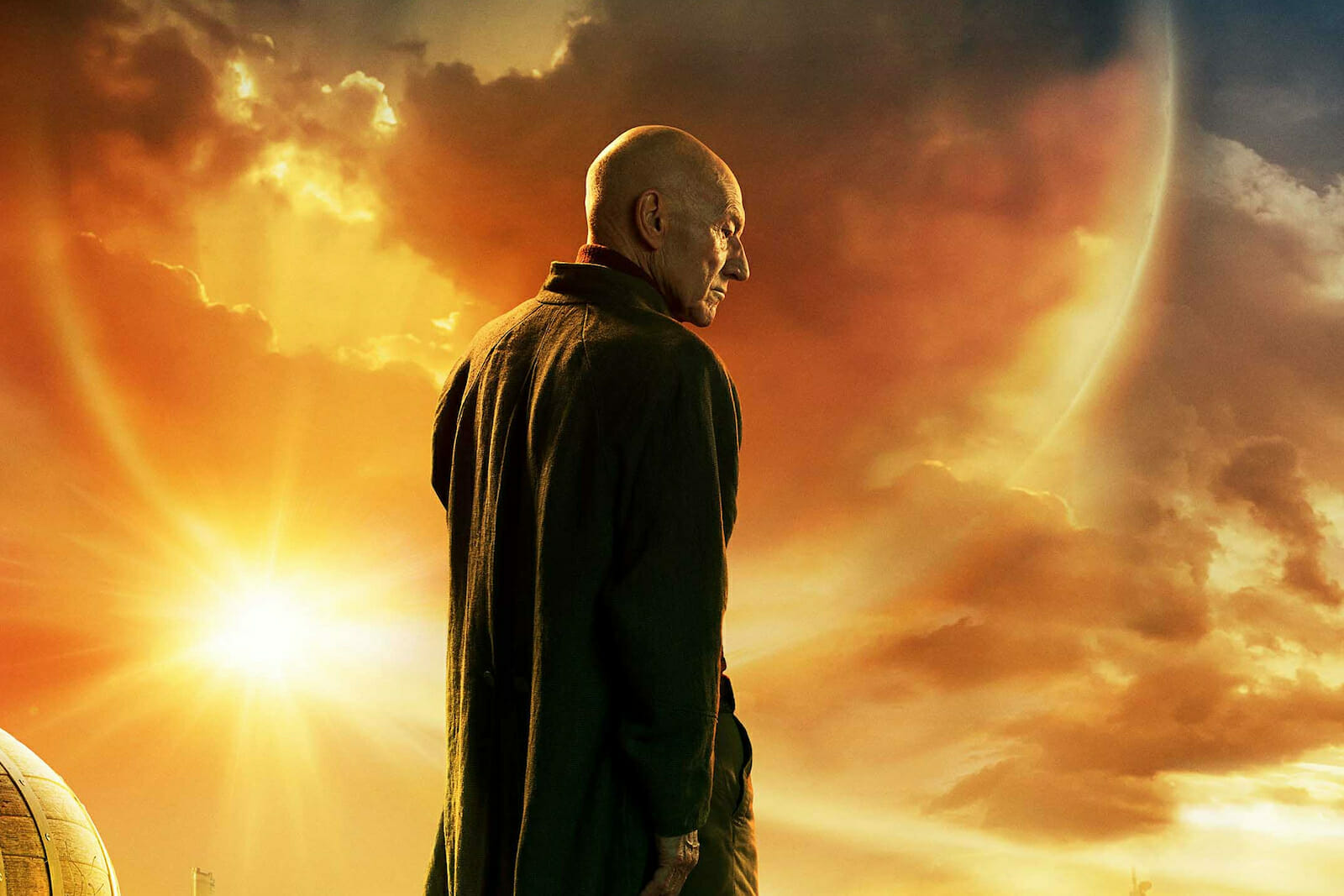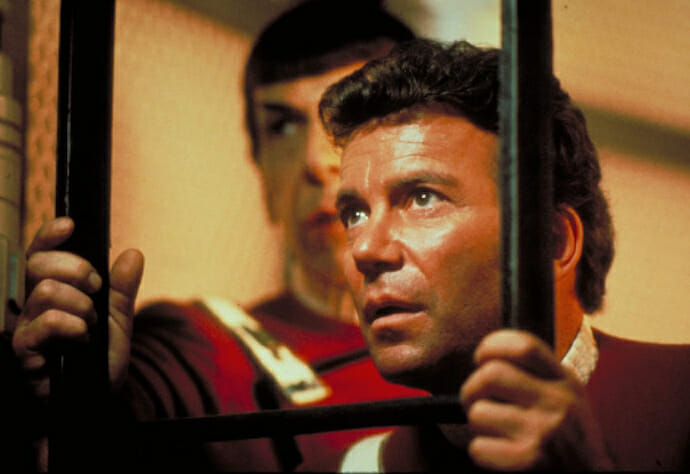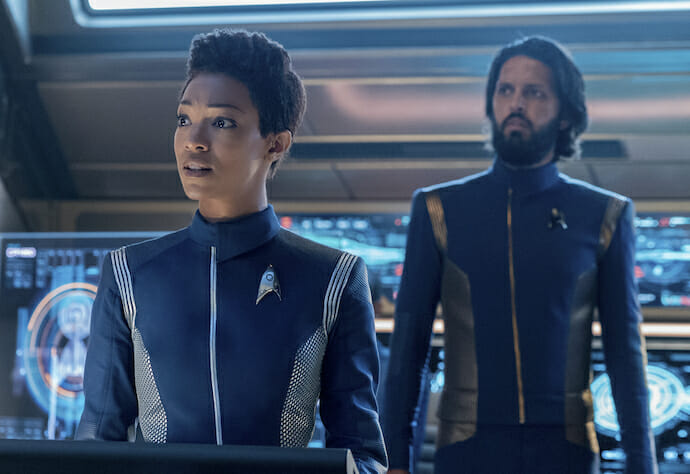
Two Trekkies Talk ‘Star Trek: Picard’
Two self-professed Trekkies, Will Mann and Joel White, debate the merits of Picard as well as the Star Trek vs. Star Wars debate.
Editor’s note: The following article contains massive spoilers for the first season of Star Trek: Picard.
Will Mann: So, I think it’s obvious that we are both huge fans of Star Trek, but as we kick-off this discussion, I want to ask you about your own personal relationship with the franchise? For me, I’m a huge fan of The Original Series and The Next Generation, I’ve seen a few episodes of both Deep Space Nine and Enterprise here and there, and I have not watched any of Voyager or Discovery. And even with both TOS and TNG, I haven’t seen every episode necessarily, there are a few gaps or a few episodes that I saw as a kid (that, let’s be honest, probably went over my head) that I never really revisited.
Strangely enough, I feel like I gravitate towards the movies more than the individual series, though episodes like TOS’s “The City on the Edge of Forever” and TNG’s “Yesterday’s Enterprise” and “The Inner Light” rank as some of the best hours of television that I’ve ever seen. But on the other hand, movies like The Wrath of Khan and First Contact rank as some of my all-time favorites, and I still greatly admire most of the original series entries numbered I-VI (excluding The Final Frontier, obviously) and even J.J Abrams’ 2009 reboot (even if Into Darkness was a huge disappointment).
Star Trek has always been in my life, to one extent or another, since I was a kid. But in terms of those truly foundational sci-fi TV shows that I obsessed over when I was a teenager or in college, that was much more things like The X-Files or Firefly.
Joel White: Star Trek and I go back a long way, all the way back to elementary school, when I used to tape (on VHS!) reruns of The Original Series on Syfy network. Today, it remains one of my favorite Trek series, ranked second only to Deep Space Nine, which I consider to be one of the best science fiction series ever produced. This is not to overlook the very real love I have for The Next Generation. It starts out slow and at times painfully bad. Remember that episode where Wesley gets put on death row for stepping on some flowers?, but hits its stride in season 3 and never really looks back. And besides, who doesn’t love Patrick Stewart?
Voyager and Enterprise, I think everyone can agree, are below average. And I just watched the first two seasons of Discovery earlier this year, and I found myself liking it quite a bit more than the majority of the fan base. Yeah, they really messed with continuity and took the narrative in some questionable directions, but the top-notch acting and stellar production values more than make up for that. Really, it’s amazing to see what a Trek series can look like when a studio is actually willing to spend some money on it.
And I agree with you on the movies, Will. Most of them are wildly entertaining, and the ones with the original cast are the real standouts (I myself am partial to The Wrath of Khan, The Voyage Home, and especially The Undiscovered Country). First Contact deserves praise, too; it’s a legitimately good space action flick. All of this is just a long-winded way for me to say that I consider myself a true Trekkie (or Trekker, if you prefer). It was my introduction to science fiction and is the franchise against which I judge all others.

Mann: The reason I wanted to ask about your personal history with the franchise is because I think how one relates to the Picard show depends a lot on how one relates to Star Trek generally.
I’m not sure if someone who wasn’t at least pretty familiar with the concepts, and particularly the characters and their personal histories from Next Gen could keep up with the plot. But one of the plot-points involves an unresolved issue from the J.J. Abrams reboot movie; a major character from Voyager is reintroduced; and the show expects you to remember the finer plot details of Star Trek: Nemesis, a movie I’m not sure I’ve seen since my mom took me to see it in the theater when I was 11.
Compare this to something like The Mandalorian, where, even if you’re not super familiar with the entire mythology of Star Wars, the simple story of this bounty hunter protecting Baby Yoda can still be easily followed. (And I’m not trying to ignite another Star Trek vs. Star Wars debate, you’re talking to a guy who believes the long-running sci-fi institution Star Trek has the most in common with is Doctor Who.) But, given that, at least Picard attempts interesting things knowing full well that first-time Trek viewers will likely be pretty alienated. I like that the first few episodes are almost a character study of Jean-Luc Picard. He’s restless in retirement, he misses the big show of Starfleet, and that reminds me a lot of Kirk at the beginning of Wrath of Khan. But he’s also grappling with guilt and grief over multiple things in his life, and I like that the show seems to be deconstructing Picard’s mythos by turning the usually thoughtful, level-headed, reliable starship captain into someone who is very vulnerable.
White: First of all, you are absolutely correct in calling Star Trek vs. Star Wars an apples-to-oranges comparison. Personally, I don’t even think Star Wars is science fiction; it’s fantasy. But I digress. Yes, Picard does draw from just about every corner of the Trek universe to set up its story. It falls short of pure “fan service,” but I agree that it would be monumentally difficult for an uninitiated viewer to really understand everything that’s going on. And I think that really is a mark against it as a series. Deep Space Nine was technically a spinoff of The Next Generation, but you didn’t need to know much of anything about TNG to get invested. While DS9 did involve two holdovers from the Enterprise-D (one a bit player and the other a main cast member), the writers made a concerted effort to explore new themes and dynamics that weren’t touched on by the previous series. Ditto Voyager, Enterprise, and Discovery, all of which boldly went (and often stumbled) into new places with fresh faces. But Picard clearly isn’t that kind of show.
Now, I don’t mean to say that’s entirely a bad thing; Picard is still trying to do something intriguing, even if it’s considerably less accessible. Essentially, the writers are looking at what the fallout might be after a lifetime of service to Starfleet. In the first episode, we meet a Captain Picard who has endured a lifetime of trauma including loss, torture, imprisonment, and enslavement only to cap off his illustrious career with one spectacular failure. And now he faces a new and different form of trauma: irrelevance. This is certainly new, character-driven ground for Trek to explore, and for that Picard deserves praise. I just wish it had been done in a way that a wider viewership could appreciate.
Mann: Well, I guess now is as good a time as any to talk about the pacing. The first four episodes felt very methodical: Picard is summoned back into duty, then he assembles a crew, then he gets a ship, then it’s off to space. But the b-plot is a little bit more muddled: it involves Soji (Isa Briones), who Picard is on a mission to save, on some kind of converted former-Borg cube run and operated by the Romulans. And she’s being tempted by a Romulan love-interest named Narek (Harry Treadaway) who, unbeknownst to her, is conspiring against her. And I think that highlights a real problem for the show: you’re naturally really invested in Picard’s story, because we’ve spent 7 seasons and 4 movies with him. But that doesn’t necessarily extend to the side-plots and newly-introduced characters. I like episode 4, “Absolute Candor,” which introduces Romulan warrior Elnor (Evan Evagora) because you see, through flashbacks, how tied he is to Picard’s personal history. But I can’t say that about characters like Agnes Jarati (Alison Pill) or Captain Rios (Santiago Cabrera). And while I like the idea of Raffi (Michelle Hurd) as someone who previously served with Picard coming along for one last mission, why couldn’t that role be filled by someone we already know well, like Worf or Geordi La Forge? When Picard does offer up TNG characters, weirdly enough, they’re characters that were featured in only a single episode or two, albeit some of the most acclaimed episodes of Next Gen. I’m thinking specifically of the return of both Bruce Maddox (John Ales, originally played by Brian Brophy) and Hugh (Jonathan Del Arco).
White: I’m debating whether or not it’s correct to label Soji’s story as a b-plot, and I think that speaks volumes about just how muddled the storytelling can be in this series. Across all 10 episodes, I vacillated between “Soji is a secondary lead” and “Soji, not Picard, is actually the main character.” That’s no good. I found myself liking many of the other new characters, though. Raffi is a great foil for Picard, as someone who shares in his trauma and copes with it in more self-destructive ways (is that a vape she’s always using?). And I loved the quirk of Santiago Cabrera getting to use a different dialect for each of his character’s holo-clones. As an actor, I appreciate what a fun challenge that can be, and Cabrera puts in some admirable work.

Mann: Another strength the first four episodes had was they kept you on your toes: there’s a fight scene at Picard’s villa in episode 3, “The End is the Beginning,” that reminds you that there really is danger around every corner. But then, when we get to episodes 5 and 6, they seem to drag a bit more. There’s a lot of action, first in Stardust City on planet Freecloud, and then later on the Borg cube. But it all seems fairly consequence-free because Picard & co. always escape danger just in the nick of time. Episode 5, “Stardust City Rag,” seems arguably more focused on Seven of Nine (Jeri Ryan), the fan-favorite Voyager character, than it does on Picard. But once Picard meets up with Soji, the show more-or-less gets a second wind.
White: And we do get to see some old friends in Riker and Troi, as Picard and Soji visit the now-married couple’s home in “Nepenthe.” (They got married in Nemesis, but we all blocked that out of our collective memory, didn’t we?) That may have actually been my favorite episode, as we spend some time with familiar faces and get to learn (through small hints that lead up to a mostly-deserved reveal) about some trauma of their own. Jonathan Frakes is so obviously thrilled to be back as Riker, and Marina Sirtis (who was never once given good material on TNG) actually gets to carry us through some of Picard‘s more tender moments.
Mann: Well, I have to admit that “Nepenthe” is also my favorite episode and easily my high-water mark for the series. I will neither confirm nor deny reports that I openly wept when Riker and Picard reunited. (It didn’t help that, rather than address him as “Number One,” Picard opts to simply call him Will. As Homer Simpson would say, “he’s named like my name!”) But that episode brings back the magic, it invokes a lot of what the show had been missing up until that point. It’s just a very sweet, tender episode. For example, I love that, after years of being second-in-command, Riker’s big quest in this episode is making a pizza. I love how much Riker and Troi’s daughter Kestra (Lulu Wilson) invokes different aspects of her respective parents’ personalities. The episode allowed us to take a deep breath and enjoy our time in the presence of these iconic friendships before we move onto the conclusion.
White: “Nepenthe” really is the calm before the storm. Things get pretty frenetic during the final three episodes, particularly “Et in Arcadia Ego,” the two-part season finale. The events of the conclusion jerk us in a few directions, as the story veers between Soji’s quest for an identity, Picard’s quest for redemption, and the hidden mystery that has been driving everyone toward this point. Turns out it was just a vast, paranoid Romulan conspiracy all along. But wait, it wasn’t that either! It was a vast, insidious conspiracy of universe-conquering robots!
Mann: I think you’re right that it only becomes apparent what the show seems to be about in its final episodes. Despite devoting countless episodes to Vulcans, Klingons, Romulans, and Borg, Star Trek has only occasionally broached the topic of androids, or “synths” as this show opts to call them. And even when it did, it was mostly through or related to the character of Data (Brent Spiner). Having the focus be on how the broader Trek-universe feels about synths is an intriguing development, as was the idea that the mere existence of them shifts the power dynamics of the galaxy. Some species like the Romulans are afraid because the synths can summon a powerful enemy that can seemingly destroy all biological life. I should mention that one of the showrunners of Picard is my favorite living writer, novelist Michael Chabon, who won a Pulitzer for my favorite book, The Amazing Adventures of Kavalier & Clay, in 2001. And just like in his books, Chabon can go down some tangents that he thinks are really interesting, but in the moment feel rather diversionary. But when he’s focused on the narrative, he can do really cool, inventive things with it. That’s what the ending to this season felt like to me. Additionally, the moment Picard and Data have at the very end…right in the feels, man.
White: On the one hand, I too love that this season took the time to delve into the moral and existential dilemmas surrounding the creation of synthetic life–something that Trek really should have done more of by now. (I will, however, point everyone who hasn’t already seen it to the truly excellent TNG episode “The Measure of a Man,” which not only features the only in-the-flesh appearance of Bruce Maddox in TNG, but does wade pretty substantially into those waters.) But on the other hand, after the whiplash of veering from Soji’s story (“Is this Trek does I, Robot?” I asked myself) to the Romulan/giant robot conspiracy (“Nope, it’s Trek does Mass Effect,” I corrected myself), I couldn’t help but wonder if the more meaningful stuff was getting lost in the fray. But then, amidst all of the confusion, Picard manages to pull everything together at the last moment and reminds us that, really, this is a show about Jean-Luc Picard’s search for the closure he desperately needed but never received after the death of Data, one of his dearest friends. And that’s certainly a story worth telling. There may be some digressions and muddled messages along the way, but Picard absolutely sticks the landing. It hit me in the feels too, even if the ultimate answer to my question of “Is Soji or Picard the main character?” turned out to be “Soji is just a plot device to further Picard’s emotional development.”
Mann: It’s interesting that we keep coming back to Soji, because I think she might actually be one of the weaker elements of the show. Isa Briones’ acting ability didn’t impress me much, and the disproportionate role that Soji plays in the narrative feels clunky. We know next to nothing about her twin, Dahj, for example, because her role seemed to be merely to die in order to motivate Picard. Despite seemingly being Data’s daughter, or at least built from the same construct, Soji has almost nothing in common with Data. There isn’t any moment where Soji’s behavior is evocative of Data, so the idea that she’s a daughter or successor to him is muddled at best.
White: I’m absolutely comfortable with saying that Soji is the show’s weakest element. And that’s no small criticism, given her outsized role. I completely agree that almost nothing about her is evocative of Data, and most of her ordeals–her fake-turned-real romance with Narek, her heel turn once they reach the synth planet–add little to nothing to the overall story. As I said before, she exists simply to create conflicts for Picard to resolve. This is certainly a serious flaw in the show’s structure, but the Trekkie in me was more than willing to gloss over it in favor of the truly great Picard-centric moments sprinkled throughout the season.

Mann: I should also say that at first, I was really opposed to the “Picard is a synth now” ending, it felt like a cop-out, the worst kind of deus ex machina. “He died…PSYCH! He didn’t!” (Truthfully, I originally thought that the purpose of Picard’s terminal illness was so that they had an in-universe explanation in case Patrick Stewart suddenly or unexpectedly died during production.) But in the context of the season as a whole, I warm up to it more because it makes the season feel much more like a journey. At first, synths are something to be feared, and now they hold the keys to Picard’s very survival. His physical body is dead, but Picard still lives on (gosh, remind you of any particular religious figures?), a physical transformation that mirrors his emotional transition. It also felt very Picard-like to insist that he still be mortal and have normal human-level strength.
White: Speaking of which, now that you mention the “Picard is a synth” ending, I feel the need to partially walk back my previous “sticks the landing” assessment of the ending. You’re absolutely right; it is a textbook cop-out. Giving Picard a surprise terminal disease, letting him finally say goodbye to Data, and then keeping him alive as an android feels kind of like fumbling the ball in the end zone. (Sorry, I came so close to making it all the way through this discussion without bringing in any sports analogies.) I see your point that it brings the entire synth arc to a somewhat poetic close, but personally, I forgave the ending much the same way I forgave the Soji storyline: by focusing on the stronger, character-based elements (in this case, Picard and Data’s poignant farewell).
Mann: I think a lot of shows these days struggle with focus, to a certain extent they’re so high concept that a lot of details or side-plots don’t get the attention that they probably deserve. I think this can be blamed on TV writers’ rooms, as opposed to the more traditional screenwriting process for movies. Star Trek in particular thrives on relatively self-contained stories, but in an environment where everyone wants to contribute, the vision is more compromised than it would be if it were coming from the mind of a single screenwriter or two.
White: As a final note, I want to clarify that for all my criticisms–its inaccessibility to new Trek viewers, the uneven pacing, the Soji problem–I truly did enjoy watching Picard. Star Trek is typically not as character focused as it could be, too often getting bogged down in alien politics and technobabble, but this was a welcome break from that. Picard explores questions of loss, failure, and decline not deeply examined by previous Treks. It lets us visit some valued old friends and lets its central character finally say goodbye to one of his closest companions. And Patrick Stewart, even at 80 years of age, is as potent a force as ever. My advice to any prospective viewers is simple: If you know and love Trek, you should add Picard to your watchlist. If not, maybe go watch everything else first.
Mann: I completely agree with your assessment of Picard, Joel. I also enjoyed it. I think of the truly standout moments, like Data and Picard’s farewell and basically all of “Nepenthe,” and the themes that initially hooked me in those first few episodes. But it’s definitely not for everyone. Some fans have derided Patrick Stewart as not caring about the Picard character, and that a lot of the show was built around Stewart’s own desires and wishes for the direction of the character. But he really is the lynchpin of the series, and I’d go as far as to say he’s the best thing about the show whenever it’s firing on all cylinders. I think something we both admire is that the show is more character-focused than previous Trek installments, and Stewart’s commitment really sells it. The show is at its best when it’s about Picard, grief, and transition.
One final question: where do you think Star Trek goes after this? Are we going to get similar series focused on Captains Sisko, Janeway, and Archer? Where do you think Picard goes after this? (I imagine a follow-up season would obviously be affected by pandemic-related precautions in a way its predecessor wasn’t.)
White: I honestly don’t know where Star Trek goes from here, and I would wager the creative minds at CBS are struggling with a similar question. After the 12-year absence between Enterprise and Discovery, it almost feels like the franchise is trying to do too much. We’ll get season 3 of Discovery later this year, immediately following the premiere of Lower Decks, the first animated Trek series since 1975, and the franchise’s first-ever attempt at a sitcom. (For the record, I am far from optimistic about that.) All of this comes as news is swirling about Strange New Worlds, a Captain Pike-centered spinoff of Discovery, and an unnamed series about Section 31. (That last one strikes me as a horrible idea, too.) To me, this feels like throwing spaghetti at the wall to see what sticks, and I worry that ultimately none of it will.
As for Picard, it struck me as a show that really didn’t need a second season. The story is neatly self-contained and it could have reached a satisfactory conclusion if the writers had simply avoided the deus ex machina ending. I would think a second season would have to focus on some entirely different, non-synth-related area of Picard’s identity. My guess is that season 2 will be, at best, significantly delayed due to COVID and, at worst, might end up getting the axe entirely. Indeed, I would not be shocked if everything other than an eventual Discovery season 4 becomes a casualty of the pandemic. Not a very rosy picture for a fan like myself to paint, but my gut tells me this is the most realistic take.

